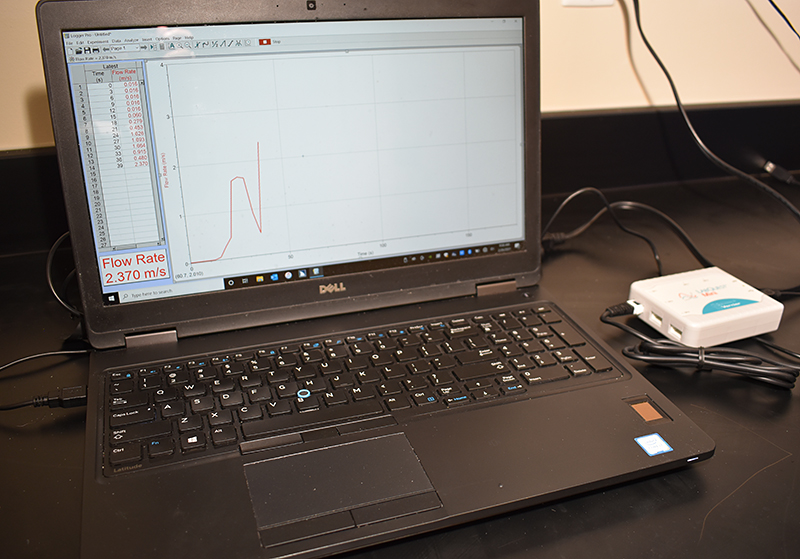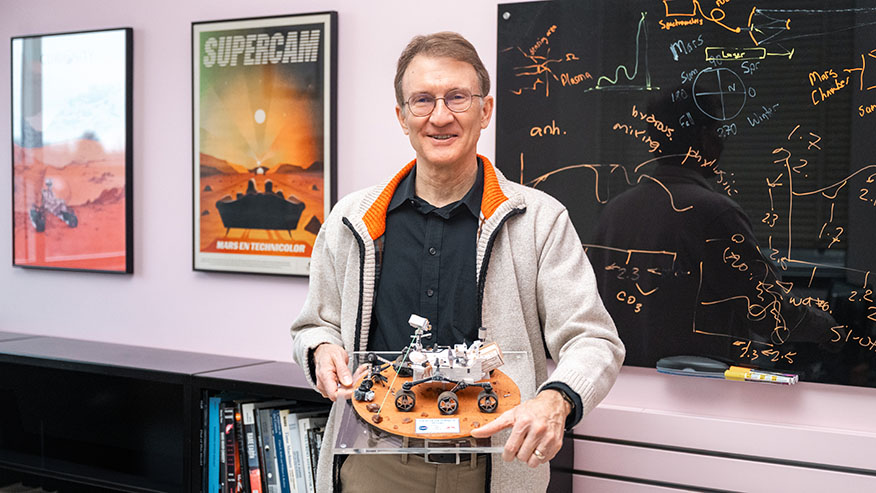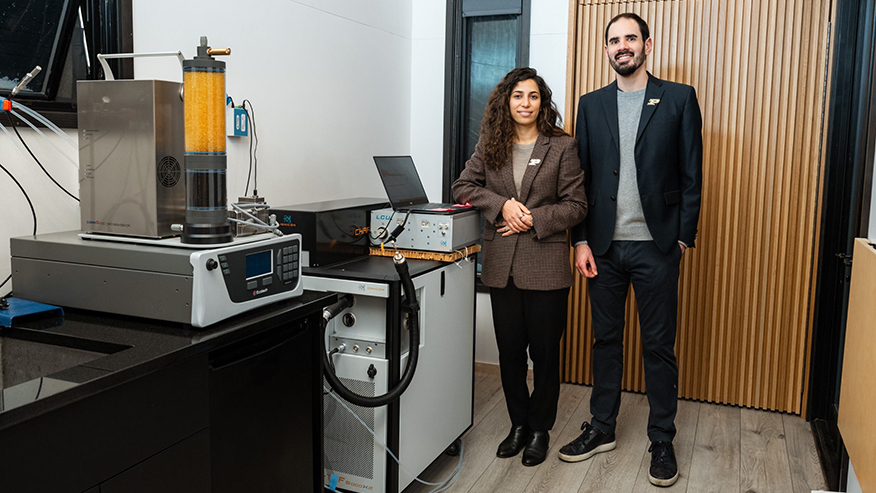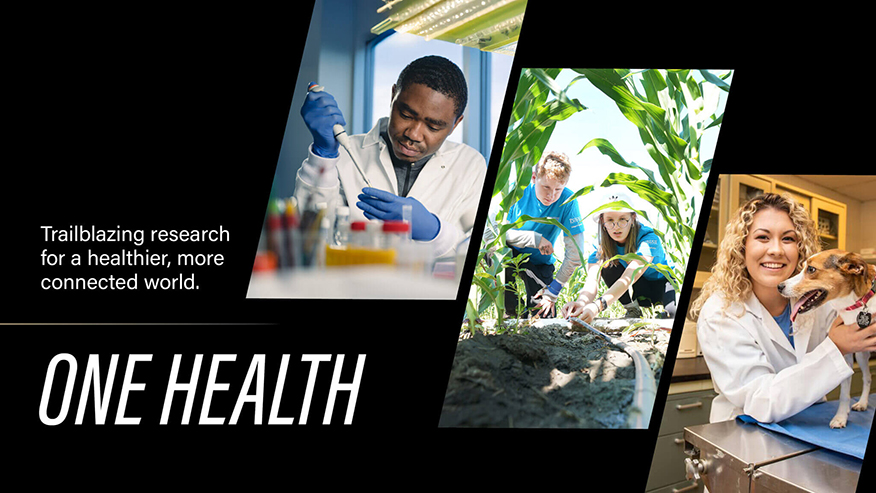Independence Science and ViewPlus Technologies partner to create science access tools for students who experience blindness or low vision

Graphical flow rate data is provided to users in an auditory way by the talking LabQuest Mini, developed by Independence Science. Independence Science and ViewPlus Technologies have announced a collaboration to develop new science access tools for people who experience blindness or low vision. (Photo provided by Independence Science)
WEST LAFAYETTE, Ind., and CORVALLIS, Ore. —
Leaders at Independence Science and ViewPlus Technologies have announced a collaboration to develop new science access tools for people who experience blindness or low vision.
Mike Hingson, spokesperson for Independence Science, said ViewPlus Technologies will leverage Independence Science’s team of blind scientists to inform product development road maps.
“It is these collaborative efforts between access technology firms that leverage one strength with another to drive innovation to its furthest potential,” Hingson said. “We will develop products that blind people want.”
Dan Gardner, CEO of ViewPlus Technologies, said, “We look forward to making STEM more accessible for all through this collaboration and ushering in a day when everyone can participate equally in STEM subjects in an inclusive way.”
ViewPlus Technologies has developed cutting-edge embossing technology capable of producing multi-dot height, tactile graphic information and Braille on the same page. In addition, ViewPlus offers a range of products that supports the use of ink for standard text and graphics, providing a more equitable collaboration experience for both sighted and blind and low-vision individuals. By allowing the use of the same document, ViewPlus is empowering people to work together more effectively, regardless of their level of vision.
“We have a great deal of expertise in embossing tactile graphics and understanding the challenges that users face when high-quality graphical information is presented,” Gardner said. “We are highly aware of what goes into producing graphical materials that consumers can use effectively. The company’s efforts are further enhanced by the fact that John Gardner, our founder, is a blind physicist who has experienced firsthand the need for quality graphic information in STEM.”
For more than 14 years, Independence Science has designed products that make STEM laboratory equipment inclusive. One is the Talking LabQuest, which presents graphical information to users two ways: sonification, which provides information to users in an auditory way, and transmission of graphic information to the ViewPlus Braille embosser line of products.
“Combined, our companies have the most hands-on experience in understanding inclusive graphic information presentations,” Hingson said. “Working together, we are confident that the best possible products will be produced to provide real-time access to students who experience blindness or low vision and other students with print access challenges.”
Hingson said there is a natural synergy between the companies because of their leaders and experience.
“First, both company founders are blind scientists who know through lived experiences the importance of inclusive access to data visualization tools and techniques,” Hingson said. “Second, both companies understand what must go into a quality product. The combined experience of the two teams will provide the best coding and widest range of capabilities that will help our users break through the ongoing attitudinal ceiling they face as they attempt to study and work in STEM-related fields.”
Hingson said the companies expect to see a working prototype of a new STEM education product that beta testers can evaluate within a short time.
“Between both companies, we have a variety of potential users and contacts we can utilize to get the best possible feedback,” Hingson said. “As product development continues, the sales and marketing teams in both companies will work together to explore, educate and penetrate potential markets.”
Independence Science is headquartered in the Purdue Research Park of West Lafayette, which is managed by the Purdue Research Foundation.
About Independence Science
Independence Science is an access technology pioneer dedicated to changing how blind people view their own capabilities about pursuing scientific careers as well as helping to educate the sighted scientific community that blind persons can make significant contributions to the STEM fields. Where before blind students and scientists only had human sighted assistants available to them, Independence Science is helping the blind reclaim their laboratory independence. Through real inclusion and access to scientific laboratories, Independence Science is evolving the way society views science accessibility and helping blind students and scientists become more successful and equal participants within the scientific community. Interested persons and organizations can contact Independence Science at info@independencescience.com.
About ViewPlus Technologies
ViewPlus Technologies, founded in 1996 by Dr. John Gardner and Carolyn Gardner, is a leading provider of innovative Braille and tactile graphics solutions. Their revolutionary TIGER technology has transformed multi-dot height tactile graphics, improving accessibility and opportunities in education and employment for blind and low-vision individuals worldwide. For more information, contact CEO Dan Gardner at dan.gardner@viewplus.com or 541-754-4002.
About Purdue Research Foundation
Purdue Research Foundation is a nonprofit corporation governed by 16 individuals who serve on a board of directors. The PRF board of directors meets quarterly to manage the business and affairs of the corporation, to prescribe and enforce policies, and to guide the corporation in achieving its objectives. Purdue Research Foundation supports Purdue University’s land-grant mission by helping the university improve the world through its technologies and graduates. Established in 1930, PRF is a private, nonprofit foundation. The foundation helps patent and commercialize Purdue technologies; builds places to encourage innovation, invention, investment, commercialization and entrepreneurship; and makes equity available to students to finance their Purdue education. For more information on licensing a Purdue innovation, contact the Office of Technology Commercialization at otcip@prf.org. For more information about involvement and investment opportunities in startups based on a Purdue innovation, contact Purdue Innovates.
Writer/Media contact: Steve Martin, sgmartin@prf.org
Sources: Mike Hingson, mhingson@independencescience.com
Dan Gardner, dan.gardner@viewplus.com



